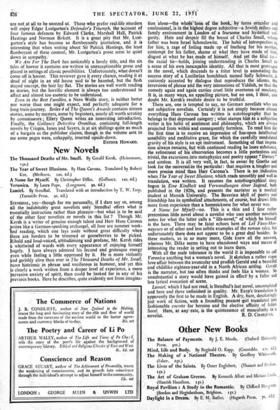New Novels
The Year of Sweet Illusions. By Hans Carossa. Translated by Robert Kee, (Methuen. los. 6d.) LamieL By Stendhal. Translated with an introduction by T. W. Earp. (Turnstile Press. 9s. 6d.) SrENDHAL, yes—though for me personally, if I dare say so, among all the indubitably great novelists only Stendhal offers what is essentially instruction rather than pleasure—but what is to be said of the other four novelists or novels in this list ? Though Mr. Kersh is a writer of genuine enough talent and Herr Hans Carossa )3/rites like a German-speaking archangel, all four are summer week- Ind reading, which one lays aside without great difficulty when there are borders to be trimmed or gooseberries to be picked. Ribald and loud-voiced, attitudinising and profane, Mr. Kersh rides a whirlwind of words with every appearance of enjoying himself hugely. I have always admired his fecund and grotesque energy aven while feeling a little oppressed by it. He is more violently nd garishly alive than ever in The Thousand Deaths of Mr. Small, snore histrionic in phrase and vociferous in humour, and yet this is clearly a work written from a deeper level of experience, a more 'Pervasive anxiety of spirit, than could be looked for in any of his previous books. Here he describes, quite evidently not from imagina-
tion alone—the whole lone of the book, by turns oracular and confessional, is in the highest degree subjective—a Jewish milieu and family environment in London of a fearsome and hysterical vul- garity. Hate and despair fill the breast of Charles Small, who father was born Israel Schmulowitz. The habit of introspection is, for him, a rage of feeling made up of loathing for his mother, contempt for his fattier, shame at what they have made of him, disgust at what he has made of himself. And yet the filial tie-- the racial tie—holds, joining understanding in Charles Small to
a.sense of his own inescapable identity. All that is most grotesque in the novel, which descends to a triter level in annotating the
success story of a Luciferian hunchback named Solly Schwartz, is curiously accented by dialogue that reproduces the idioms, the inversions of phrase and the very intonations of Yiddish, so that the comedy again and again carries cruel little overtones of mockery. It is, in many ways, an appalling picture, but no one, I think, can doubt Mr. Kersh's resolute desire to be truthful.
There are, one is tempted to say, no German novelists who are not subjective novelists. Certainly it is not simply because almost everything Hans Carossa has written is autobiography that ho belongs to that depressed category ; what stamps him as a subjective writer is his habit of sentiment and philosophy, which are always projected from within and consequently formless. To read him for the first time is to receive an Impression of fine-spun intellectual sensibility and meditative grace, for which the carefully modulated gravity of his style is an apt instrument. Something of that impres- sion always remains, but with continued reading he loses substance, the refinement of his observation becomes a little portentous and trivial, the excursions into metaphysics and poetry appear "literary" and aimless. It is all very well, in fact, to swear by Goethe and look for the universal-in the particular: that requires a_tougher and more precise mind than Herr Carossa's. There is no indication when The Year of Sweet Illusions, which reads smoothly and well in translation, was written. It resumes the autobiographical story begun in Eine Kindheit and Verwandlungen einer Jugend, both published in the 1920s, and presents the narrator as a medical student at Munich University. The Bavarian idyll of poetry and friendship has its symbolical attachments, of course, but draws little more from experience than a homesickness for what never was.
A Name for Myself—no. This is a thin and I fear rather pretentious little novel about a novelist who uses another novelist's notes for what the latter calls a " life-novel," of which he himself is the hero. There may be faint echoes here of Les Faux-Mon- nayetirs or of other and less subtle examples of the roman vecit, but unfortunately there does not appear to be a great deal besides. In these matters, as in so many more, Gide knew all the answers, whereas Mr. Dilke seems to have abandoned ways and means of interesting the reader in setting out to learn them.
With all the male tolerance in the world it is impossible to call Veronica anything but a woman's novel. It sketches a rather vague love affair between the avuncular and prudish Gerald and a beautiful and childlike eighteen-year-old in a North African setting. Gerald is the narrator, but too often thinks and feels like a woman. So unsubstantial a story would have gained in effect by a fuller and less lyrical evocation of scene.
Lamle!, which I had not read, is Stendhal's last novel, uncompleled and here and there unfinished in quality. Mr. Earp's 'translation is apparently the first to be made in English. A dry, bare, desolatingly just work of fiction, with a foundling peasant -girl translated into fashionable cocotte for heroine and the elective affinity of Julien Sorel. Here, at any rate, is the quintessence of masculinity in a


















































 Previous page
Previous page